 MyDogBreeds
MyDogBreeds Schweizer Niederlaufhund is originated from Switzerland but German Pinscher is originated from Germany. Schweizer Niederlaufhund may grow 7 cm / 2 inches shorter than German Pinscher. Both Schweizer Niederlaufhund and German Pinscher are having almost same weight. Both Schweizer Niederlaufhund and German Pinscher has almost same life span. Both Schweizer Niederlaufhund and German Pinscher has almost same litter size. Both Schweizer Niederlaufhund and German Pinscher requires Low maintenance.
Schweizer Niederlaufhund is originated from Switzerland but German Pinscher is originated from Germany. Schweizer Niederlaufhund may grow 7 cm / 2 inches shorter than German Pinscher. Both Schweizer Niederlaufhund and German Pinscher are having almost same weight. Both Schweizer Niederlaufhund and German Pinscher has almost same life span. Both Schweizer Niederlaufhund and German Pinscher has almost same litter size. Both Schweizer Niederlaufhund and German Pinscher requires Low maintenance.
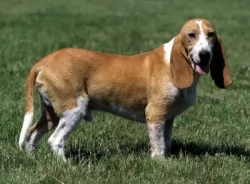 Originating in Switzerland, the Schweizer Niederlaufhund was established around 1900, when hunting became restricted to districts. The Swiss hunter needed a slower dog for the limited territory they could hunt in. Crossing selected Schweizer Laufhunds with Basset Hounds and other selected smaller, short legged hounds developed the Schweizer Niederlaufhund. By 1905 there was already a Schweizer Niederlaufhund Club.
Originating in Switzerland, the Schweizer Niederlaufhund was established around 1900, when hunting became restricted to districts. The Swiss hunter needed a slower dog for the limited territory they could hunt in. Crossing selected Schweizer Laufhunds with Basset Hounds and other selected smaller, short legged hounds developed the Schweizer Niederlaufhund. By 1905 there was already a Schweizer Niederlaufhund Club.
The Niederlaufhund became one of the best hunting dogs in the world, with its powerful body and ability to outhunt the Laufhund in tracking big game. Slower of course than the Laufhund it has a great sense of smell and an ability to easily find wounded animals. There are a few varieties, just like with the Swiss Hound again mostly because of their coloring. The Luzerner Niederlaufhund, the Jura Neiderlaufhund, and the Schwyzerlaufhund. They have musical voices that they use to communicate with the hunters and each other as well as that amazing sense of smell. They can hunt for hours without tiring and without much information from the hunter.
They are a cross breed not recognized by the larger kennel club such as the AKC and the UKC. They are recognized by the Dog Registry of America, Inc. (DRA), the American Canine Association Inc. (ACA) and most importantly by the Federation Cynologique Internationale (FCI). This last one is important because it could lead to recognition as a new breed by the UKC and the AKC.
 The German Pinscher or Deutscher Pinscher originates in Germany. When you look at the dog you can see the the Doberman, the Rottweiler, Schnauzer, Affenpinscher and Miniature Pinscher have all played a role in the dog’s development.
The German Pinscher or Deutscher Pinscher originates in Germany. When you look at the dog you can see the the Doberman, the Rottweiler, Schnauzer, Affenpinscher and Miniature Pinscher have all played a role in the dog’s development.
There have been drawings of the German Pinscher which have been seen in dog books as early as 1884 and some drawings even earlier than this date. The dogs have descended from early European herding breeds.
The German Pinscher came to breeders of the United States in the 1980s, and the German Pinscher Club of America was started by German Pinscher fanciers, with the dog gaining acceptance by the Canadian Kennel Club in 2000.
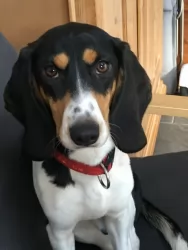 The Schweizer Niederlaufhund is a medium size, short dog. They look like their cousins, the Schweizer Laufhund but smaller. Their body is just slightly longer than it is tall, so you are left with the impression of a mostly square dog. The Niederlaufhund is well put together, with strong legs, a noble head, long droopy ears, broad chest, and a low held tail.
The Schweizer Niederlaufhund is a medium size, short dog. They look like their cousins, the Schweizer Laufhund but smaller. Their body is just slightly longer than it is tall, so you are left with the impression of a mostly square dog. The Niederlaufhund is well put together, with strong legs, a noble head, long droopy ears, broad chest, and a low held tail.
The Small Lucerne Hound has a white cote with smooth speckles of black or gray making them appear to be blue.
The Small Bernese Hound has a tricolor coat of white, tan and black. There are tan marks on the eyebrows. There is a wire haired Small Bernese as well. He has a short beard.
The Small Schwyz Hound is smooth coated in white with orange or yellow-red patches. The wired haired version is extinct.
The Small Jura Hound is a single coated dog with a black coat and tan marking above his eyes as eyebrows as well. He might have some white as well.
 The German Pinscher is a medium sized dog with a square build, looking very much like the Doberman Pinscher we know so well, but slightly smaller. Dogs and bitches stand roughly 45 to 50cm at the withers and the dog weighs between 14 to 20kg.
The German Pinscher is a medium sized dog with a square build, looking very much like the Doberman Pinscher we know so well, but slightly smaller. Dogs and bitches stand roughly 45 to 50cm at the withers and the dog weighs between 14 to 20kg.
The dog is lean and muscular with a tight fitting skin. He has a short, smooth coat which can be brown, reddish brown or black and tan. He has a black nose, dark eyes and he has either high set drop ears or the ears are specifically erect.
In fact, with German Pinschers, they have always had their ears cropped and their tails docked, but these days the tail is left and unfortunately that distinctive look is gone.
Energetic, spirited, lively, confident, intelligent, fearless and loyal are just some of the characteristics of this amazing dog who is guaranteed to make you an excellent watchdog and companion.
The German Pinscher is a playful, good natured dog and he’ll make a good pet for households where there are other pets as well as children. He is a loving and loyal companion with an even temperament, although he is strong-willed and stubborn and will therefore need training and socialization. He then becomes a super obedient pet.
He can fit into city- or country life but he is an energetic dog and will certainly require being exercised every day. Like any other dog, he can become bored and frustrated when put into the backyard and left there by himself day after day.
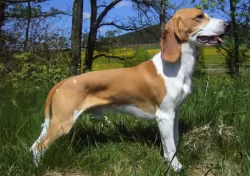 Children friendliness – yes, they are but use caution around small children and small prey.
Children friendliness – yes, they are but use caution around small children and small prey.
3. Adaptability - needs room to run and explore – is very frustrated when confined.
 The German Pinscher is a working dog bounding in energy. He just loves being involved with all the activities of his human family.
The German Pinscher is a working dog bounding in energy. He just loves being involved with all the activities of his human family.
He is playful and assertive and will require a firm, balanced owner who is consistent with the rules laid down for the dog. It will be more than worthwhile having him trained and socialized as he becomes obedient, loyal and devoted.
He is intelligent and quick to learn and it simply turns him into a splendid pet. Add him to your family, and you’ll feel as though you’ve added a wonderful dimension to your home.
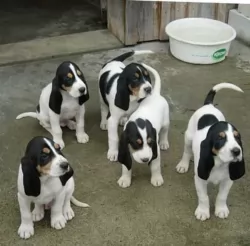 The Niederlaufhund Is prone to a very medical issues to keep an eye on. They include:
The Niederlaufhund Is prone to a very medical issues to keep an eye on. They include:
• Hip Dysplasia – This comes from hip joints that are not well formed and cause reduced mobility and pain. Parents can be tested before the dogs are bred to make sure their hips are good, and that dysplasia will not be passed to puppies. This dysplasia can cause arthritis and even lameness.
• Ear Infections – With long drooping ears it is easy for the dog to acquire ear infections. This is even more so for a hunting dog like the Niederlafhund. It is important to clean the dog’s ears on a regular basis.
 When you see your German Pinscher standing lean and strong, you can’t think of him ever getting an illness. And yet, even a strong dog like this, who can reach 10 – 14 years of age with good nutrition, can get sick.
When you see your German Pinscher standing lean and strong, you can’t think of him ever getting an illness. And yet, even a strong dog like this, who can reach 10 – 14 years of age with good nutrition, can get sick.
Look out for von Willebrand's blood-clotting disorder as well as heart disease and hip dysplasia with your German Pinscher.
This is a blood disease where there is a deficiency of von Willebrand Factor which results in the blood not clotting properly. The condition can lead to excessive bleeding with your pet after he has had an injury for instance.
You may notice bleeding from the gums, bloody urine or feces as well as bruising of the skin. Get him to the vet who will perform an examination of your pet.
Remember that some health problems seen in a dog are inherited, and if you can get certificates from the breeders proving that the parents have been cleared of hereditary eye diseases, hip dysplasia and blood clotting disease for instance, your dog will have less risks of developing any of these serious conditions.
Also many illnesses can be eliminated by providing your pet with excellent food, clean water, a warm dry place to sleep and lots of love and attention.
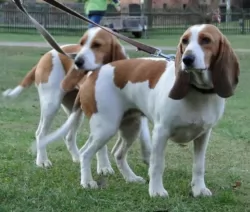 1Feeding the puppy - give 1 cup per day of high quality dog food divided into 3 meals.
1Feeding the puppy - give 1 cup per day of high quality dog food divided into 3 meals.
2.Feeding the adult – give one and one half cups of high quality dog food divided into 2 meals.
4. Games and Exercises – needs a lot of daily exercise and loves field trials, running and activities like barn hunt.
 The German Pinscher, because he is a muscular, energetic dog, should be fed a high-quality dog food that suits his size and his energy levels. If you feed him one of the commercially manufactured dog foods, make sure of the ingredients, as you don’t want food that is full of fillers, colorants and preservatives.
The German Pinscher, because he is a muscular, energetic dog, should be fed a high-quality dog food that suits his size and his energy levels. If you feed him one of the commercially manufactured dog foods, make sure of the ingredients, as you don’t want food that is full of fillers, colorants and preservatives.
Choose high quality foods and sometimes mix in your own home cooked brown rice, vegetables and chicken. Adding in some raw meat occasionally will enhance his health too and help him towards staving off common dog illnesses. He should always have access to fresh, cool water.
He is a high energy dog and will require hectic exercise such as ball- and rope-pulling games, hikes, swimming and walks every day.
His short, smooth coat will require brushing twice a week to remove loose hairs and help it to maintain that sleek, glossy look.
Remember to check his ears for wax and dirt build up as well as for ear hematomas. These swellings inside your dogs ear can also be as a result of something stuck inside your dog’s ear or from your dog scratching his ear because of mites.